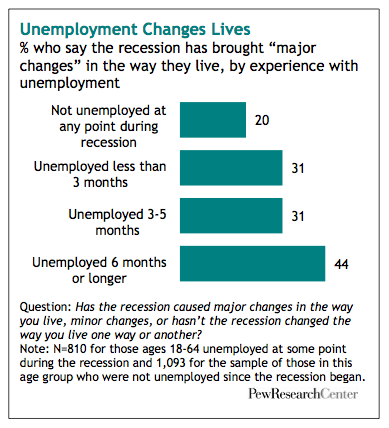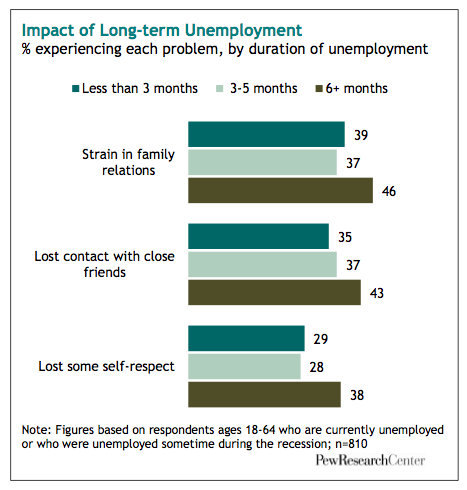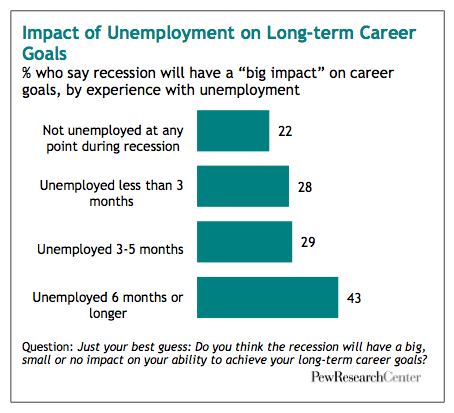Long-term unemployment takes a much deeper toll than short-term unemployment on a person’s finances, emotional well-being and career prospects, according to a new Pew Research Center survey that explores the attitudes and experiences of workers who have lost jobs during the Great Recession.
Of those who have experienced an unemployment spell of at least six months, more than four-in-ten (44%) report that the recession has caused “major changes” in their lives. By comparison, fewer than a third (31%) of those who had been unemployed less than six months and 20% of adults who were not unemployed during the recession say they were similarly affected.
To measure the impact of unemployment during the Great Recession, the Pew Research Center interviewed 810 adults ages 18 to 641 who are currently unemployed or who were jobless sometime since the recession officially began in December 2007. They were part of a nationally representative survey of 2,967 adults conducted May 11-31, 2010.
Pew Center researchers also analyzed recent employment data to create a demographic portrait of the long-term unemployed.2 According to the Bureau of Labor Statistics (BLS), the median duration of unemployment stood at 25.5 weeks in June 2010, meaning half of the unemployed — the largest proportion since World War II — have been looking for work for six months or more. The previous high, in May 1983, was 12.3 weeks, less than half the level today. The Center’s demographic analysis finds that the median duration is highest among older workers, blue-collar workers and black workers. However, all workers, regardless of race or ethnicity, age, gender, nativity or occupation, have experienced a sharp increase in long-term unemployment during the recession.
 Together, the survey and analysis of employment data document how a prolonged period of joblessness can strain household budgets, test personal relationships, force changes in career plans and erode self- confidence. Key findings include:
Together, the survey and analysis of employment data document how a prolonged period of joblessness can strain household budgets, test personal relationships, force changes in career plans and erode self- confidence. Key findings include: 
- Family finances: A majority of the long- term unemployed (56%) say their family income has declined during the recession, compared with 42% who were out of work less than three months and 26% of adults who have not been unemployed since the recession began in December 2007. Overall, the long-term unemployed are also more likely to say they are in worse shape financially now than before the recession.
- Impact on relationships: Nearly half (46%) of those unemployed six months or more say joblessness has strained family relations, compared with 39% of those who were out of work for less than three months. At the same time, more than four- in-ten (43%) long-term unemployed say they lost contact with close friends
- Loss of self-respect: Nearly four- in-ten (38%) long-term unemployed report they have lost some self-respect while out of work, compared with 29% who were jobless for shorter periods of time. The long-term unemployed also are significantly more likely to say they sought professional help for depression or other emotional issues while out of work (24% vs. 10% for those unemployed less than three months).
- Impact on career goals: More than four-in-ten (43%) of the long-term unemployed say the recession will have a “big impact” on their ability to achieve their long-term career goals. Among those unemployed less than three months, 28% said being jobless would have a similarly serious impact.
- Am I in the right job? More than seven-in-ten long-term unemployed say they changed their careers or job fields or seriously thought about doing so. They also were more likely to pursue job retraining programs or other educational opportunities while out of work.
- Settling for less: Among workers who found a job after being unemployed for six months or longer, about three-in-ten (29%) say their new job is worse than the one they lost, compared with only 16% of re-employed workers who had been jobless for less than six months. In separate questions, these workers also report their new job paid less and had worse benefits than their old one.
- Pessimism on the job hunt: Among adults who are currently unemployed, those who have been jobless for six months or longer are significantly more pessimistic than the short-term unemployed about their chances of finding a job as good as the one they lost.
While the long-term unemployed have suffered the most during the Great Recession, the survey found that shorter spells of unemployment also have been painful for many Americans and their families

For example, a third of all long-term unemployed (33%) say they have had problems paying their rent or mortgage — identical to the proportion of those unemployed less than three months who experienced difficulty paying for housing. This proportion is more than double the share of Americans who have not been jobless at any point during the recession but who have had difficulty paying for housing during the recession (16%).

The remainder of this report examines in more detail how the unemployed — particularly the long-term unemployed — have fared during the Great Recession. Chapter 1 offer a demographic profile of the long-term unemployed. The report then examines the problems encountered by those who have been unemployed during the recession and the larger hardships faced by the long-term unemployed. The final chapter examines how long-term unemployment affects workers even after they find another job and the attitudes of the currently unemployed.
Read the full report for more details.


